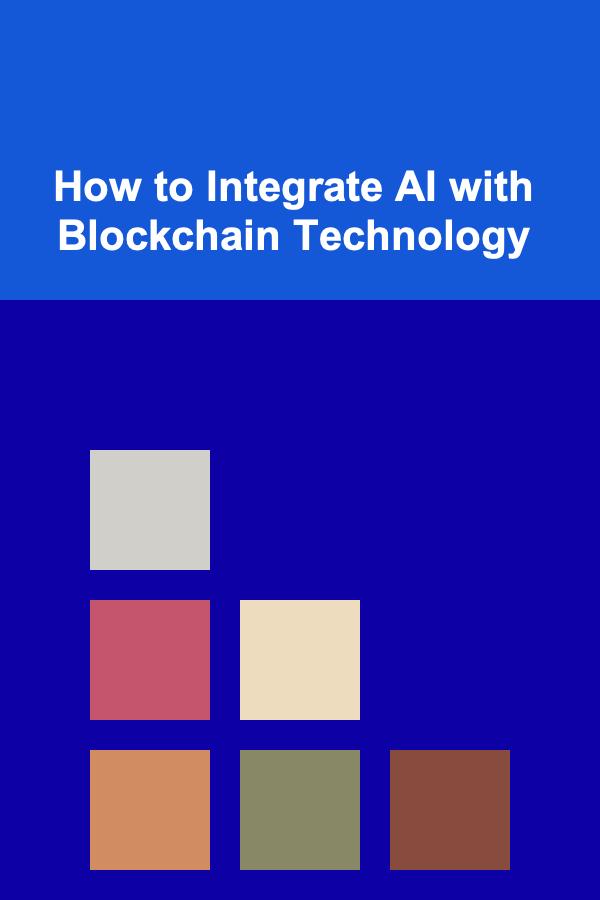
How to Integrate AI with Blockchain Technology
ebook include PDF & Audio bundle (Micro Guide)
$12.99$6.99
Limited Time Offer! Order within the next:

The fusion of Artificial Intelligence (AI) and Blockchain technology is transforming various sectors, offering innovative solutions that enhance data security, transparency, and automation. AI and Blockchain have each proven their disruptive potential in their respective domains, but when integrated, they unlock a vast array of possibilities. From decentralized AI systems to secure machine learning models, the convergence of AI and Blockchain holds immense promise. This article delves into how these two cutting-edge technologies can be integrated, exploring the benefits, challenges, and potential use cases of such integration.
Understanding AI and Blockchain Technologies
Before diving into how AI and Blockchain can work together, it's essential to understand the fundamental principles behind each technology.
Artificial Intelligence
Artificial Intelligence (AI) refers to the simulation of human intelligence processes by machines, particularly computer systems. AI encompasses various subfields, including machine learning (ML), natural language processing (NLP), robotics, and computer vision. The core idea behind AI is to enable machines to learn from data and improve their performance over time without explicit programming.
Machine learning, a prominent branch of AI, focuses on developing algorithms that allow computers to learn from and make predictions based on data. Deep learning, a more advanced subset of machine learning, uses neural networks to model complex patterns and relationships in data.
Blockchain Technology
Blockchain is a distributed ledger technology that ensures secure, transparent, and immutable record-keeping. A blockchain is essentially a chain of blocks, each containing transaction data. These blocks are linked together in a way that makes altering or tampering with previous blocks extremely difficult, thus ensuring the integrity and security of the data stored on the blockchain.
Blockchain is best known for its association with cryptocurrencies like Bitcoin, but its applications extend far beyond digital currencies. It can be used for secure transactions, supply chain management, identity verification, and decentralized applications (dApps). Blockchain's decentralized nature means there is no central authority overseeing transactions, which promotes transparency and security.
The Synergy Between AI and Blockchain
While AI and Blockchain are powerful technologies on their own, integrating them can result in solutions that neither can provide alone. The synergy between AI and Blockchain lies in their complementary strengths.
1. Enhancing Data Security and Privacy
One of the primary benefits of Blockchain technology is its ability to ensure data integrity and security through encryption and decentralization. AI models, particularly in machine learning and deep learning, often require vast amounts of data to function effectively. However, ensuring the privacy and security of this data can be a challenge, especially with the increasing concerns around data breaches and misuse.
By integrating Blockchain with AI, data can be securely stored and accessed in a decentralized manner, ensuring that AI models can work on high-quality, tamper-proof datasets. Blockchain ensures that data cannot be altered after it has been entered into the ledger, providing trust and accountability for AI models.
For instance, in healthcare, Blockchain can store sensitive patient data in a secure, decentralized way, while AI can analyze this data to provide predictive analytics for better diagnosis and treatment. This ensures that the data remains private and secure while enabling AI to access valuable insights.
2. Improving Trust and Transparency in AI Models
AI algorithms, especially those in machine learning, often operate as black boxes, meaning their decision-making processes are not easily understood by humans. This lack of transparency can be a major barrier to trust, especially in critical applications like finance, healthcare, and law enforcement.
By integrating Blockchain with AI, we can make AI models more transparent. Blockchain can be used to track and record the decisions and processes of AI systems in a verifiable way. For example, every decision made by an AI model could be recorded on a Blockchain, creating an immutable audit trail. This audit trail allows for greater transparency in the AI model's operations and provides accountability for its decisions.
3. Decentralizing AI Systems
AI models typically rely on centralized servers and data repositories, which can be vulnerable to attacks and can raise concerns around data ownership and control. Blockchain can help decentralize AI systems, allowing them to operate on a distributed network.
In a decentralized AI system, individual nodes or participants in the network can contribute to training AI models, providing data, or sharing computational power. This creates a more equitable and transparent system, where no single entity has control over the AI model or its data. It also reduces the risk of a single point of failure, making the system more resilient and secure.
For instance, in decentralized AI marketplaces, participants can exchange data and computational resources for training AI models, ensuring that AI development is collaborative and open. Blockchain provides the necessary infrastructure for such decentralized AI systems to operate securely.
4. Enabling Autonomous Smart Contracts for AI
Smart contracts, which are self-executing contracts with the terms of the agreement directly written into code, are one of the most powerful applications of Blockchain technology. These contracts automatically execute when predefined conditions are met, without the need for intermediaries.
When combined with AI, smart contracts can become even more powerful. AI can be used to assess the conditions that trigger a smart contract, ensuring that the contract is executed only when the right criteria are met. Additionally, AI can help monitor and update the terms of smart contracts based on real-time data analysis.
For example, in supply chain management, AI can monitor the conditions of products (such as temperature or humidity) in real-time. When specific conditions are met, a smart contract can automatically execute, triggering payments or other actions, without the need for human intervention.
5. Improving AI Model Training and Validation
Training machine learning models requires massive amounts of data, and the quality of this data is critical for the success of the model. Blockchain can be used to create a decentralized data marketplace, where high-quality, verified datasets are made available for AI model training. This ensures that AI models are trained on accurate, reliable, and tamper-proof data.
Furthermore, Blockchain can help validate the outcomes of AI models. In cases where AI models are used to make predictions or decisions (e.g., credit scoring or healthcare diagnosis), Blockchain can be used to create a verifiable record of the model's performance. This provides an immutable history of how the model arrived at its decisions, which can be useful for auditing and ensuring compliance with regulatory standards.
Use Cases for AI and Blockchain Integration
The integration of AI and Blockchain has the potential to revolutionize various industries. Here are some key areas where the combination of these technologies can bring significant benefits:
1. Healthcare
AI and Blockchain integration can improve healthcare data management, patient privacy, and predictive analytics. Blockchain can securely store patient records, while AI can analyze this data to offer personalized treatment plans. Blockchain ensures that patient data is tamper-proof, while AI models can help in diagnosing diseases, recommending treatments, and predicting health outcomes.
Additionally, AI-powered smart contracts can automate administrative tasks like billing and insurance claims processing, reducing costs and improving efficiency.
2. Supply Chain Management
Supply chains can benefit significantly from the integration of AI and Blockchain. Blockchain provides transparency and traceability of goods from origin to destination, while AI can optimize routes, predict demand, and improve inventory management. AI can also analyze data from the Blockchain to identify inefficiencies or areas for improvement in the supply chain, enabling businesses to reduce waste and improve productivity.
3. Financial Services
In the financial sector, AI and Blockchain can enhance fraud detection, risk management, and trading. Blockchain's immutable ledger ensures that all transactions are recorded transparently, while AI can be used to analyze transaction data in real-time to detect fraudulent activities. AI can also optimize investment strategies by analyzing large datasets and making predictions based on market trends.
4. Autonomous Vehicles
Autonomous vehicles, which rely on AI for decision-making, can be further enhanced by Blockchain for secure data sharing and communication between vehicles. Blockchain can provide a decentralized platform for vehicles to share data in real-time, while AI can use this data to make split-second driving decisions. Blockchain ensures that the data exchanged between vehicles is secure, reducing the risk of hacking or manipulation.
5. Identity Management
Blockchain can provide a secure and decentralized method for managing digital identities, while AI can be used for biometric authentication and identity verification. The combination of these technologies can enhance security, reduce fraud, and ensure privacy in digital transactions and interactions.
Challenges and Considerations
While the integration of AI and Blockchain holds immense potential, there are several challenges that must be addressed for successful implementation.
1. Scalability
Both AI and Blockchain face scalability challenges. AI models require significant computational resources and large datasets, while Blockchain's decentralized nature can lead to slower transaction times and higher costs. Integrating the two technologies must account for these scalability issues to ensure that the system can handle large volumes of data and transactions efficiently.
2. Data Privacy
While Blockchain offers data security, privacy concerns remain, especially in industries like healthcare and finance. AI models often require access to large amounts of personal data, and ensuring that this data is used ethically and securely is crucial. Blockchain can help by providing secure and decentralized data storage, but it is important to implement additional privacy-preserving technologies, such as encryption and zero-knowledge proofs, to ensure data privacy.
3. Regulatory and Legal Issues
The integration of AI and Blockchain must comply with various regulatory and legal frameworks, which can differ across jurisdictions. Data privacy laws, intellectual property rights, and other regulatory issues must be carefully considered when developing AI and Blockchain solutions. Collaboration between governments, industry stakeholders, and technologists is necessary to create clear guidelines and standards for AI and Blockchain integration.
4. Interoperability
For AI and Blockchain to work together seamlessly, there must be interoperability between different Blockchain networks and AI systems. This requires standardization and the development of protocols that enable AI models and Blockchain networks to communicate effectively.
Conclusion
The integration of AI and Blockchain technology presents an exciting frontier in the world of innovation. By combining AI's ability to analyze and learn from vast amounts of data with Blockchain's ability to provide secure, transparent, and decentralized record-keeping, we can unlock new possibilities for industries ranging from healthcare to finance and beyond. However, the challenges of scalability, privacy, regulation, and interoperability must be addressed to fully realize the potential of these technologies. As both AI and Blockchain continue to evolve, their integration promises to create more secure, efficient, and trustworthy systems that will shape the future of technology.

How to Avoid the Pitfalls of Payday Loans
Read More
How to Decorate Your Bedroom for the Holidays for a Cozy Retreat
Read More
How to Keep Your Car Organized for Family Trips
Read More
How to Store Seasonal Items Efficiently in Small Spaces
Read More
How to Utilize Coupons and Discounts in Your Budget
Read More
How to Use ChatGPT for Virtual Role-Playing
Read MoreOther Products

How to Avoid the Pitfalls of Payday Loans
Read More
How to Decorate Your Bedroom for the Holidays for a Cozy Retreat
Read More
How to Keep Your Car Organized for Family Trips
Read More
How to Store Seasonal Items Efficiently in Small Spaces
Read More
How to Utilize Coupons and Discounts in Your Budget
Read More